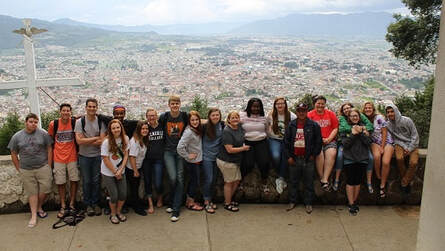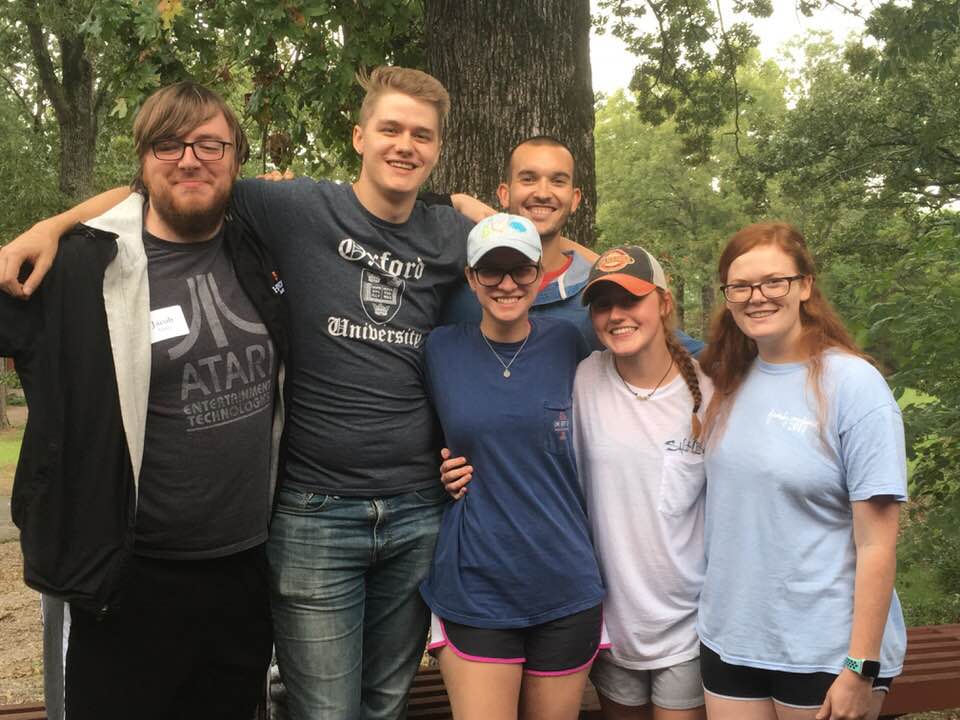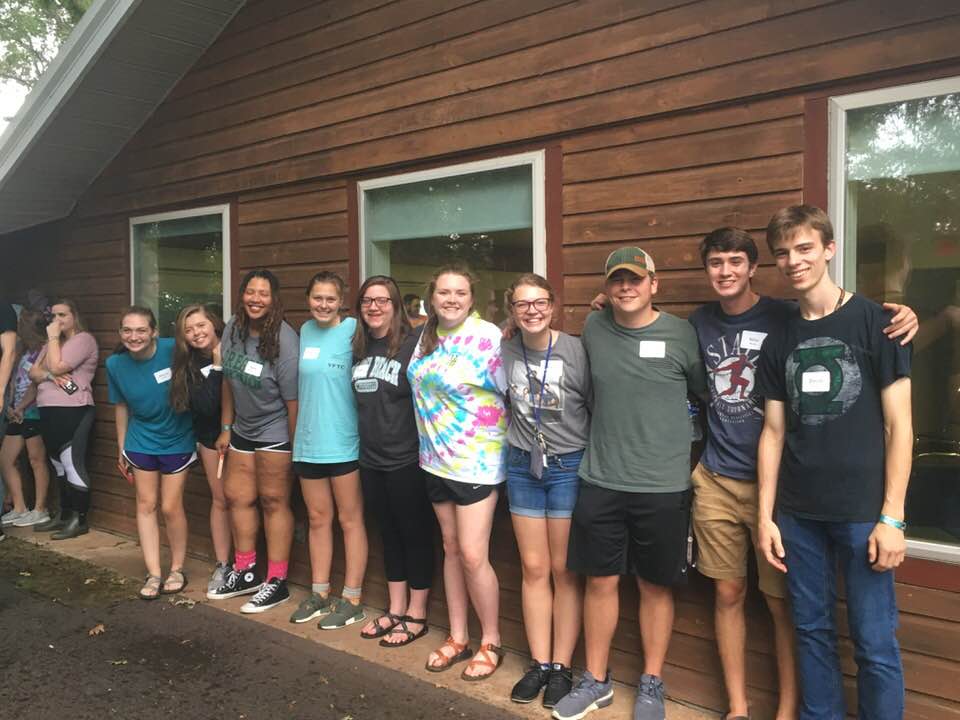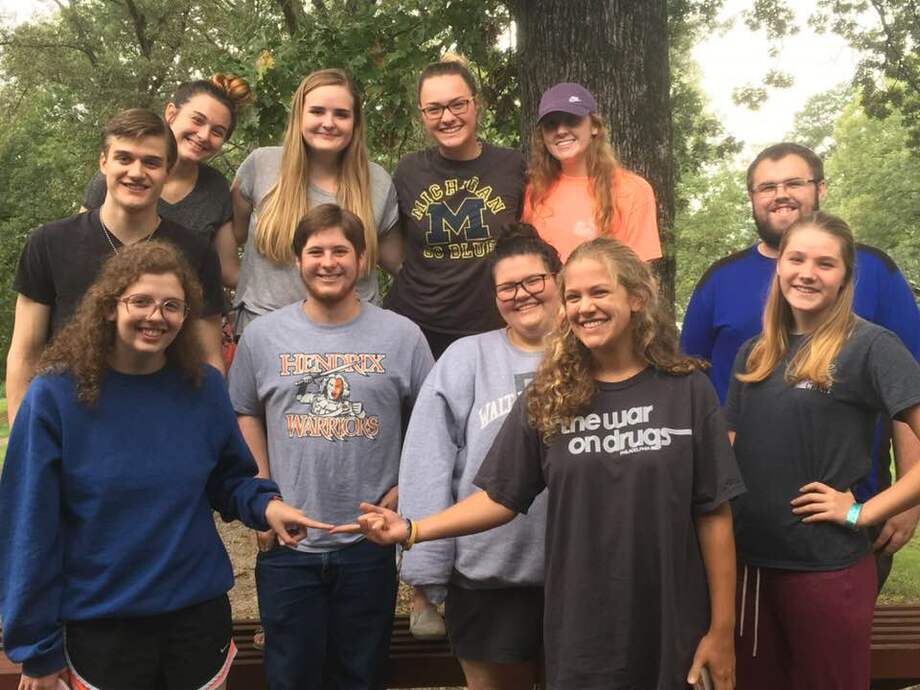- Home
- Process Worldview
- Community
- Art and Music
- Whitehead and Process Thinking
- Podcasts
- Spirituality
- Ecological Civilization
- Education
- Contact
- Social Justice
- Science
- Animals
- Sacred Poems
- Whitehead Videos
- Index of All Titles
- Practicing Process Thought
- Process Spirituality: A Spiritual Alphabet
- Recent Posts
I've learned so much from Young Methodist Youth such as those who attend Hendrix College. They call themselves UMY's. I call them Young Wesleyans.
Talking with them over the years, I see that they understand something that is sometimes lost to their elders. They know that the Wesleyan Way is a fresh possibility that can offer hope for the world, if liberated from an excessive preoccupation with rigid belief and any hint of mean-spiritedness.
This Way was anticipated in John and Charles Wesley, but it comes from the future not the past: that is, from God's beckoning presence. It invites us (1) to recognize God as pure universal love, embracing each and all, including poor and powerless people, and also other animals, (2) to open our hearts to God's spirit, God's breathing, as it helps transform our hearts into love, and (3) to accept God's call to help build communities that are creative, compassionate, participatory, humane to animals, and ecologically wise, with no one left behind. As Young Wesleyans envision it, the Wesleyan Way is not closed or narrow, but rather open and free. Sometimes it is also just plain fun.
The Wesleyan Way is also Christ-centered. Long before the Wesleys, the Way was revealed but not exhausted in Jesus, in whose healing ministry, death, and resurrection we have a window to the God of love. Our task, the UMY's add, is to extend his healing ministry, grateful for the grace that precedes us, accepts us, and calls us.
In the beginning and in the end, they say, is the grace -- understood not simply as an idea but as an experience.
That's what I learn from young Wesleyans. I learn to consider the possibility, sometimes neglected by overly orthodox Christians, that God is really Love.
-- Jay McDaniel
Talking with them over the years, I see that they understand something that is sometimes lost to their elders. They know that the Wesleyan Way is a fresh possibility that can offer hope for the world, if liberated from an excessive preoccupation with rigid belief and any hint of mean-spiritedness.
This Way was anticipated in John and Charles Wesley, but it comes from the future not the past: that is, from God's beckoning presence. It invites us (1) to recognize God as pure universal love, embracing each and all, including poor and powerless people, and also other animals, (2) to open our hearts to God's spirit, God's breathing, as it helps transform our hearts into love, and (3) to accept God's call to help build communities that are creative, compassionate, participatory, humane to animals, and ecologically wise, with no one left behind. As Young Wesleyans envision it, the Wesleyan Way is not closed or narrow, but rather open and free. Sometimes it is also just plain fun.
The Wesleyan Way is also Christ-centered. Long before the Wesleys, the Way was revealed but not exhausted in Jesus, in whose healing ministry, death, and resurrection we have a window to the God of love. Our task, the UMY's add, is to extend his healing ministry, grateful for the grace that precedes us, accepts us, and calls us.
In the beginning and in the end, they say, is the grace -- understood not simply as an idea but as an experience.
That's what I learn from young Wesleyans. I learn to consider the possibility, sometimes neglected by overly orthodox Christians, that God is really Love.
-- Jay McDaniel
Confessions of an Older Wesleyan
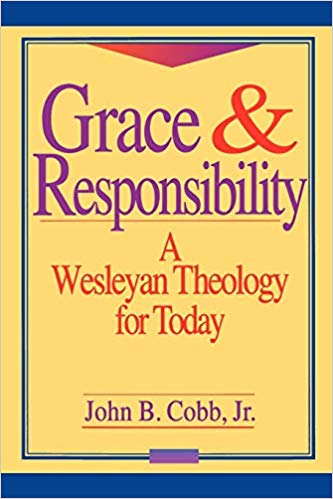
When John Cobb published Grace and Responsibility: A Wesleyan Theology for Today, he sent me a signed copy and added, as a note, "To Jay the Wesleyan." I was honored to receive the note, because I had such respect for the Wesleyans I knew at Hendrix College: the chaplains, the students, and two colleagues: Dr. John Farthing and Dr. Francis Christie.
Still I was surprised. I grew up a United Methodist and went to Sunday School, but I never really thought of myself as a Wesleyan prior to John's note. I thought of myself instead as a Christian influenced by Buddhism with an appreciation of what I knew of Wesley, but also an appreciation of many other traditions, including the Catholic tradition (I'm a Benedictine Oblate) and the Episcopal tradition (I often attend Episcopal liturgies).
I'm sure I'm not a Wesleyan in a full sense. I believe most of what Thomas Oord says below, but like Oord I would want to "wrestle over the details and haggle over the concepts and language."
For example, I do think Jesus’ life, death, and resurrection makes possible a fruitful relationship with God, but I also think that other sages and traditions make possible fruitful relationships, so I’m not sure Jesus is the "only way" to salvation. This will irritate some older Wesleyans, I'm sure.
And sometimes I'm not exactly sure I believe in the Trinity, either at least if it means that God is literally three distinct persons, each with agency. My only consolation here is that Jesus didn't believe in the Trinity, either, at least thus understood. But if we understand Trinitarianism simply as an invitation to say "yes" to relationality in God and in ourselves, then I'm on board completely.
Five Pillars of Methodism
Still there are some ideas identified by Oord that speak to me especially deeply, and to many others, I am sure. I'll name five of them. You might call them Five Pillars of Methodism.
1. One is that God is not an angry judge bent upon punishing sinners and rewarding saints, rather God is pure universal love (Charles Wesley). Imagine a cosmic mind surrounding the universe filled with compassion and wisdom, sharing in the joys and sufferings of all, and seeking the well-being of all. Imagine that this mind both "feels the feelings" of all living being with tender care and responds to what is felt by offering fresh possibilities for healing and wholeness, relative to the situation at hand. Imagine that this God has a timeless dimension but also a deeply temporary side, becoming along with universe, moment by moment. That's God.
2. A second is that the very purpose of living is to grow into a likeness of God, not simply outwardly but also inwardly: that is, to be perfected in love. This is what it means to be "sanctified" in the Wesleyan tradition. It is to grow in love in its widest sense: love of others, love of self, love of life. We are to be holy as God is holy, which means to be channels of God's love in the world.
3. A third idea is that process of growing in love is not an act of the will, but the work of the Holy Spirit within us. God is not simply up in the sky or the heavens; God is a healing wind, a divine Breathing, in the world itself and inside each of us. To grow into love, we must feel the wind; we must breathe with the breathing, and let it do its work inside us. We may partake of spiritual disciplines to do this: prayer, worship, meditation, study, acts of loving-kindness, but our very partaking of these disciplines is not a willful growth in perfection, but a willing cooperation with the Spirit.
4. A fourth idea is that God is ecological. God values and redeems all of creation, including the animals. As we seek to grow in love, we love our neighbors as ourselves, recognizing that the poor and powerless, the forgotten and forsaken are among our most important human neighbors, and we also recognize that other creatures and the earth itself are, in their way, neighbors. Thus, we take as our aim to build communities that are creative, compassionate, participatory, egalitarian, humane to animals, and good for the Earth, with no one left behind. They are just, sustainable, and joyful.
5. A fifth idea is that, when we come to thinking about how we might grow in love and interact with others, we can turn to four sources: the Bible, Tradition, Reason, and our own Experience. The Bible itself can be listened to reverentially, but it need not be approached literally. We can recognize its historical context; we can disagree with it; but it is our friend and conversation partner. And at the same time, we can learn from our own experience, from tradition, and from human reason.
So there you have it. Five Pillars of the Wesleyan spirit. Some would argue that there are many more: Tom Oord gives us Twelve. I won't haggle over the numbers. But I will say that these five pillars are one of the reasons I am happy to be a United Methodist and be a (wish I were more faithful) communicant at a local Methodist church. These five pillars are enough for me to sing, sometimes even heartily, those good old fashioned Charles Wesley hymns and feel like, in some especially important way, they are possibilities from a future not yet realized: future tense and not just past tense. My own sense is that, despite the hardships the United Methodist church faces today, it is a wonderful platform for young Methodists!
-- Jay McDaniel
Still I was surprised. I grew up a United Methodist and went to Sunday School, but I never really thought of myself as a Wesleyan prior to John's note. I thought of myself instead as a Christian influenced by Buddhism with an appreciation of what I knew of Wesley, but also an appreciation of many other traditions, including the Catholic tradition (I'm a Benedictine Oblate) and the Episcopal tradition (I often attend Episcopal liturgies).
I'm sure I'm not a Wesleyan in a full sense. I believe most of what Thomas Oord says below, but like Oord I would want to "wrestle over the details and haggle over the concepts and language."
For example, I do think Jesus’ life, death, and resurrection makes possible a fruitful relationship with God, but I also think that other sages and traditions make possible fruitful relationships, so I’m not sure Jesus is the "only way" to salvation. This will irritate some older Wesleyans, I'm sure.
And sometimes I'm not exactly sure I believe in the Trinity, either at least if it means that God is literally three distinct persons, each with agency. My only consolation here is that Jesus didn't believe in the Trinity, either, at least thus understood. But if we understand Trinitarianism simply as an invitation to say "yes" to relationality in God and in ourselves, then I'm on board completely.
Five Pillars of Methodism
Still there are some ideas identified by Oord that speak to me especially deeply, and to many others, I am sure. I'll name five of them. You might call them Five Pillars of Methodism.
1. One is that God is not an angry judge bent upon punishing sinners and rewarding saints, rather God is pure universal love (Charles Wesley). Imagine a cosmic mind surrounding the universe filled with compassion and wisdom, sharing in the joys and sufferings of all, and seeking the well-being of all. Imagine that this mind both "feels the feelings" of all living being with tender care and responds to what is felt by offering fresh possibilities for healing and wholeness, relative to the situation at hand. Imagine that this God has a timeless dimension but also a deeply temporary side, becoming along with universe, moment by moment. That's God.
2. A second is that the very purpose of living is to grow into a likeness of God, not simply outwardly but also inwardly: that is, to be perfected in love. This is what it means to be "sanctified" in the Wesleyan tradition. It is to grow in love in its widest sense: love of others, love of self, love of life. We are to be holy as God is holy, which means to be channels of God's love in the world.
3. A third idea is that process of growing in love is not an act of the will, but the work of the Holy Spirit within us. God is not simply up in the sky or the heavens; God is a healing wind, a divine Breathing, in the world itself and inside each of us. To grow into love, we must feel the wind; we must breathe with the breathing, and let it do its work inside us. We may partake of spiritual disciplines to do this: prayer, worship, meditation, study, acts of loving-kindness, but our very partaking of these disciplines is not a willful growth in perfection, but a willing cooperation with the Spirit.
4. A fourth idea is that God is ecological. God values and redeems all of creation, including the animals. As we seek to grow in love, we love our neighbors as ourselves, recognizing that the poor and powerless, the forgotten and forsaken are among our most important human neighbors, and we also recognize that other creatures and the earth itself are, in their way, neighbors. Thus, we take as our aim to build communities that are creative, compassionate, participatory, egalitarian, humane to animals, and good for the Earth, with no one left behind. They are just, sustainable, and joyful.
5. A fifth idea is that, when we come to thinking about how we might grow in love and interact with others, we can turn to four sources: the Bible, Tradition, Reason, and our own Experience. The Bible itself can be listened to reverentially, but it need not be approached literally. We can recognize its historical context; we can disagree with it; but it is our friend and conversation partner. And at the same time, we can learn from our own experience, from tradition, and from human reason.
So there you have it. Five Pillars of the Wesleyan spirit. Some would argue that there are many more: Tom Oord gives us Twelve. I won't haggle over the numbers. But I will say that these five pillars are one of the reasons I am happy to be a United Methodist and be a (wish I were more faithful) communicant at a local Methodist church. These five pillars are enough for me to sing, sometimes even heartily, those good old fashioned Charles Wesley hymns and feel like, in some especially important way, they are possibilities from a future not yet realized: future tense and not just past tense. My own sense is that, despite the hardships the United Methodist church faces today, it is a wonderful platform for young Methodists!
-- Jay McDaniel
What does it mean
to be a Wesleyan?
- Thomas Oord
- God’s primary attribute is love. Or, as Charles Wesley put it in a hymn: “God’s name and nature is love.”
- God is triune. The Father has been revealed in Jesus Christ through the power of the Holy Spirit.
- God acts first in every moment to offer salvation, and humans freely respond to God’s offer. God’s action that enables creaturely free response is called “prevenient grace.”
- Jesus’ life, death, and resurrection make possible a fruitful relationship with God and hope for transformation in this life and the next.
- God does not predestine some to heaven and others to hell. All have the opportunity to experience eternal life both now and in the future.
- Christians should consult the Bible, Christian tradition, reason, and contemporary experience (i.e., the Wesleyan quadrilateral) when deciding how to think and act as Christians.
- The Bible’s primary purpose is to teach the way of salvation. One may or may not affirm its statements about scientific, historical, or cultural matters.
- The Church and its practices are crucial to Christian understanding, right living, and compassion toward others and oneself.
- God values and seeks to redeem all creation: humans and nonhumans. God cares about the whole and not just a few.
- Transformation from a life of sin to a life of love begins in this life. Christians are not merely waiting for the afterlife. They can experience and promote abundant life now.
- Personal and corporate religious experience, not merely rational consent to Christian doctrines, characterizes the flourishing Christian. Both heart and head matter.
- Christians are sanctified as they respond appropriately to God’s empowering love. Sanctified Christians love God, others, and all creation, including themselves. Some responses to live in holiness represent important turning points in the Christian life.
More could be said. Theologians like me wrestle over the details and haggle over concepts and language. But these brief statements provide an overview of what makes the Wesleyan theological tradition so attractive to me and others."
Reviews of John Cobb's
Grace and Responsibility
"In this important work, John Cobb provides an excellent example of what is desperately needed in the church, an appreciation and appropriation of Wesleyan theology in the context of contemporary needs and issues. John enters into critical dialogue with Wesley, permits us to listen in, and invites us to join and expand the dialogue. The result is a book which both summarizes Wesleyan theology and models a truly Wesleyan means of doing theology. He maintains the traditional emphasis on 'practical divinity' by avoiding excessively technical language as he connects Wesley's theological affirmations with contemporary issues and critiques them in the light of new insights and contemporary concerns. My hope is that John's honest and insightful attempt at defining a Wesleyan theology for today will inspire others to do the same. Such a serious dialogue with Wesley by scholars, church leaders, pastors, and laity is our best hope for the recovery of an authentically Wesleyan ethos, deeply rooted in theological vitality and rnissional commitment."
-Bishop Kenneth L. Carder, Nashville Area, The United Methodist Church
" At last, a contemporary Methodist systematic theologian engaging his Wesleyan roots as seriously as he does current theological agendas! It is hard to imagine who is better suited for this task than John Cobb. He has been at the center of a wide range of recent theological developments. And he has taken the time to gain a responsible grasp of both Wesley himself and later Wesley scholarship. Drawing on these resources he undertakes an extended critical dialogue with Wesley on a series of pressing issues for Methodists today. The resulting insights are numerous, profound, and often provocative. Indeed, the value of this book is not only the conclusions it reaches but the debates it is sure to spawn. If future participants bring the same integrity of method and concern for the church to their work as Cobb models here, the prospects for Methodist theology (and our unique contribution to the larger Christian community) are promising indeed! Do not miss this book!"
-Randy L. Maddox, Sioux Palls, South Dakota
-Bishop Kenneth L. Carder, Nashville Area, The United Methodist Church
" At last, a contemporary Methodist systematic theologian engaging his Wesleyan roots as seriously as he does current theological agendas! It is hard to imagine who is better suited for this task than John Cobb. He has been at the center of a wide range of recent theological developments. And he has taken the time to gain a responsible grasp of both Wesley himself and later Wesley scholarship. Drawing on these resources he undertakes an extended critical dialogue with Wesley on a series of pressing issues for Methodists today. The resulting insights are numerous, profound, and often provocative. Indeed, the value of this book is not only the conclusions it reaches but the debates it is sure to spawn. If future participants bring the same integrity of method and concern for the church to their work as Cobb models here, the prospects for Methodist theology (and our unique contribution to the larger Christian community) are promising indeed! Do not miss this book!"
-Randy L. Maddox, Sioux Palls, South Dakota
Methodists Like to Sing
|
|
|


